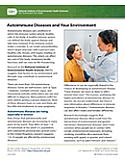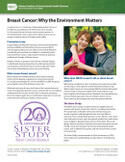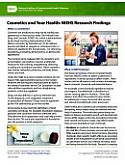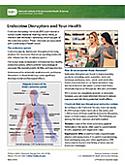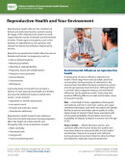Introduction

Women's health is an essential part of the NIEHS research agenda. Researchers investigate environmental, lifestyle, and behavioral factors to prevent or reduce the chance of women developing health problems.
Certain health conditions and diseases are specific to women, two of which are endometriosis and uterine fibroids.
Endometriosis – This common gynecological disease affects about 5.5 million women in the U.S. It occurs when the lining of the uterus grows on the surface of organs in the pelvic and abdominal areas. Endometriosis can cause great pain and menstrual complications, and it is a leading cause of infertility. There are treatment options for the condition.
Uterine fibroids – Also known as leiomyomas, these non-cancerous tumors are made of smooth muscle cells and fibrous connective tissue, and they can range from microscopic to several inches in size. Fibroids usually are not a critical problem but may cause physical pain and may affect emotional health. They can appear with endometriosis. Fibroids are a leading cause of hysterectomies in the United States.
Many women (70% or more) have fibroids by age 50, although they may not be aware of them. Up to half of these women have symptoms that can include:
- Heavy menstrual bleeding
- Prolonged menstrual periods
- Pelvic pressure or pain
- Frequent urination or constipation
- Painful intercourse
What is NIEHS Doing?
At NIEHS, scientists conduct in-house research related to women’s health in laboratories, using data sets from studies they developed, or using extant data from external sources.
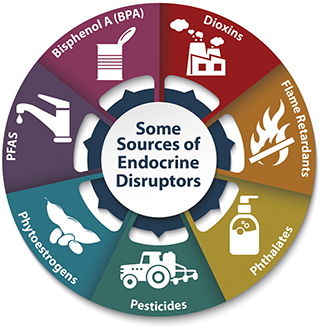
Researchers supported by grant funding from NIEHS conduct many studies on diverse environmental factors that may affect women’s health. Related topics include health effects from air and water pollutants, endocrine disruptors such as phthalates and PFAS, pesticides, and metals such as arsenic, lead, and mercury.
Research conducted by NIEHS grant recipients concerns Reproductive System Disorders and how exposure to environmental pollutants can affect the function of female reproductive systems. Reproductive health problems can occur at any life stage. Studies include birth defects of the reproductive system, pregnancy complications, early puberty, developmental disorders, low birth weight, preterm birth, reduced fertility, impotence, and menstrual disorders.
Endometriosis Studies
Research efforts include examining the role of inflammation and environmental exposures in the development of endometriosis with the goal of detecting disease and identifying preventative measures to reduce the risk of endometriosis.
The Women’s Risk of Endometriosis project studied endometriosis among 18–49-year-old females enrolled in a large health care system in western Washington State. This study found:
- Persistent environmental chemicals, such as some pesticides, may affect endometriosis risk.
- Higher levels of bisphenol A (BPA) in urine was associated with an increased risk of pelvic endometriosis, but not ovarian endometriosis.
- Women fed soy formula as infants had more than twice the level of endometriosis when they reached adulthood than women who did not.
Fibroid Studies
Study of Environment, Lifestyle & Fibroids (SELF) – Uterine fibroids are an understudied condition. Fibroids are more common and more severe among Black women, who are 80% more likely to develop them. Of Black women who have fibroids, 1 in 5 will have a hysterectomy, as compared to 1 in 15 white women who have fibroids. Researchers seek to understand why.
To learn more, SELF enrolled about 1,600 Black women, ages 23 to 34, without a prior clinical diagnosis of fibroids. SELF is the first study to measure and analyze fibroid growth in a large, high-risk group of Black women.
In the study, ultrasound screening is used to detect new fibroids and follow fibroid growth over a five-year period. Researchers are looking at vitamin D deficiency, reproductive tract infections, ancestry, and other possible risk factors for fibroid development. Findings include:
- Fibroid growth varied by initial size. Small fibroids, less than 2 centimeters in diameter, can have rapid growth but also a high chance of shrinking or disappearing. Larger fibroids grow more slowly. For example, a 2-centimeter fibroid is likely to take 4-5 years to double in diameter. Fibroid-growth information may be useful for developing treatment strategies.
- Girls fed soy-based formula during infancy may have an increased risk of fibroids in adulthood.
- Many young Black women with fibroids may go undiagnosed. Data suggest that these women could benefit from ultrasound screening when they experience symptoms such as heavy menstrual bleeding, anemia, or pelvic pain.
- A maternal history of fibroids, especially when diagnosed at a younger age, is a risk factor for fibroids in women participating in SELF. The researchers suggest that clinicians consider proactively discussing fibroid symptoms with their patients and encouraging patients to discuss fibroids with family members. This effort could encourage patient self-advocacy and inform care.
Uterine Fibroid Study – This study involved women aged 35 to 49 who were randomly selected from the membership rolls of a large health care system. Researchers found:
- Adequate vitamin D in premenopausal women is associated with a reduced risk of uterine fibroids in both Black and white women.
- An increased fibroid risk in the daughters of women who took prenatal diethylstilbestrol (DES) to prevent pregnancy complications.
The Environmental Pollutants and AHR pathway in Uterine Leiomyoma study aims to determine the role of the tryptophan–kynurenine–aryl hydrocarbon receptor (AHR) pathway, which is activated by genetic and environmental factors when normal cells become abnormal. Understanding how fibroids develop is essential for identifying new non-surgical treatments, and the NIEHS-funded researchers hope their study leads to new treatments.
Women's Reproductive Health Research
NIEHS-supported researchers are studying effects of environmental chemicals on the reproductive tract. Findings from NIEHS-supported research include:
- Discovering that unbalanced progesterone signals may cause some pregnant women to experience preterm labor or prolonged labor. During pregnancy, the hormone progesterone helps to prevent the uterus from contracting and going into labor prematurely. This occurs through molecular signaling involving progesterone receptor types A and B, referred to as PGR-A and PGR-B. In this first-of-its-kind study, the scientists showed how unbalanced PGR-A and PGR-B signaling can affect pregnancy duration by further showing how hormones influence labor. The findings provide novel insights for developing treatments that could be used to help women when the uterus goes into labor too soon or for a prolonged period.
- Identifying gene signatures in mouse ovarian tumors that shed light on what progesterone may be doing in human hormonal cancers. This finding informs what drives the development of ovarian cancer in mice and humans.
- Sister Study researchers (see paragraph below) found women who used chemical hair straightening products were at higher risk for uterine cancer compared with women who did not report using these products. The researchers found that women who reported frequent use of hair straightening products, defined as more than four times in the previous year, were more than twice as likely to go on to develop uterine cancer compared with those who did not use the products. Studies show that incidence rates of uterine cancer have been rising in the United States, particularly among Black women.
Intimate care products may be associated with increased risk of hormone-related cancers. Sister Study researchers also found, in a 2024 study, that genital talc use was positively associated with the risk of ovarian cancer. The association was particularly strong among women who used talc frequently, for a longer duration of time, and during their 20s and 30s, a period of significant hormonal change and reproductive activity. Additionally, frequent douching, and douching during young adulthood, was associated with increased ovarian cancer risk.
A “positive association” means that there may be a link between genital talc use and increased risk for developing ovarian cancer, but it does not prove that genital talc causes ovarian cancer. The study does not implicate specific brands of talc powder or douche products and does not identify a specific chemical of concern.
The also study looked at but did not find significant associations between genital talc use or douching and breast or uterine cancers.

The inVitD Trial, conducted inhouse at NIEHS, is examining how vitamin D supplementation affects reproductive hormones.
Nutrition and Menstrual Cycles Study (CaREFREE Study: Calorie Restriction, Environment, and Fitness: Reproductive Effects Evaluation) analyzes how nutrition, fitness, and the environment affect women’s menstrual cycles.
The Demystifying a Girl's First Period study aims to obtain a better understanding of normal hormonal dynamics during the transition from menarche to the establishment of mature ovulatory cycles – a prerequisite for fertility.
In the Apple Women's Health Study, NIEHS teamed with the Harvard T.H. Chan School of Public Health and Apple to learn more about how certain demographic and lifestyle factors could affect menstrual cycles and gynecologic conditions including infertility, menopause, and polycystic ovary syndrome. This first-of-its-kind study has more than 100,000 participants across the U.S. The study includes tracking data from iPhones and/or Apple Watches and participants’ survey responses. The study design embeds privacy while making it accessible to all women, regardless of socioeconomic status, race, geographical location, or other factors. In addition to the research team at Harvard, the Fertility and Reproductive Health Group at NIEHS analyzes data from this study.
Breast Cancer Research

The NIEHS Sister Study is the nation’s largest study on how environmental and genetic factors influence risk of breast cancer and other diseases. Participants of this ongoing study are more than 50,000 sisters of women with breast cancer in the U.S., including Puerto Rico.
Because of their shared environment, genes, and experiences, studying sisters provides a good chance of identifying risk factors and ways to prevent breast cancer. The study design offers ability to identify environmental exposures over the life course that increase the chance of developing breast cancer, and to identify how genes and the environment interact to increase disease risk. More than 300 scientific papers, with highlights available, have been published from this study.
The NIEHS-funded study called Environmental Chemical Body Burden and Prospective Breast Cancer Risk in the Cancer Prevention Study-3 Cohort will focus on levels of perfluoroalkyl and polyfluoroalkyl substances (PFAS) in the bodies of women, 40 – 57 years of age, and a potential resulting risk of developing invasive breast cancer during the menopausal transition.
Other Research and Initiatives
The Circulating levels of Persistent Organic Pollutants and Subclinical Atherosclerosis progression in Postmenopausal women study investigates the long-term associations of persistent organic pollutant (POP) concentrations in plasma and atherosclerosis progression in postmenopausal women who are at high risk of cardiovascular disease.
A sub-study of the Study of Women’s Health Across the Nation (SWAN), conducted by NIEHS grant recipients, seeks to better understand how a wide range of environmental chemicals may affect the pathogenesis of type-2 diabetes and metabolic syndrome in women from midlife to late-life.
Women represent 80% of patients diagnosed with autoimmune diseases, although sex ratios differ among individual diseases. The Environmental Autoimmunity Group at NIEHS uses multidisciplinary approaches to understand the roles of genetic and environmental risk factors for the development of autoimmune diseases.
Women’s Health Awareness is a multidisciplinary program designed to enhance research for understudied, underrepresented, and underreported populations of women in North Carolina. It seeks to:
- Increase community health resiliency.
- Provide evidence-based community interventions to promote wellness, environmental health literacy, and environmental public health.
Further Reading
Stories from the Environmental Factor (NIEHS Newsletter)
- Tampons May Contain Some Toxic Metals, According to New Study (August 2024)
- Moderate Radon Exposure Associated With Increased Risk of Stroke in Women (April 2024)
- Personal Care Product Use During Puberty May Affect Breast Cancer Risk (April 2024)
- Phthalate Exposures Associated With High Numbers of Preterm Birth (April 2024)
- Community Engagement Critical to Addressing Women’s Health Concerns (December 2023)
- Risk for Female Reproductive Cancer May Increase After Early-life Exposure to Endocrine-disrupting Substances (November 2023)
- AI, Machine Learning Can Help Diagnose Polycystic Ovary Syndrome (November 2023)
- Women Treated for Breast Cancer May Age Faster Than Cancer-free Women (August 2023)
- Reducing Phthalates in Beauty Products May Lower Health Risks, Disparities (May 2023)
- Scientific Journeys: From Clinical Subject to Endometriosis Researcher (August 2022)
- Preterm Birth, Prolonged Labor Influenced by Progesterone Balance (April 2021)
- Chemicals in the Environment Can Harm Maternal Health (February 2021)
- Studies Link FOXL2 Protein to Female Infertility, Cancer, Endometriosis (January 2021)
- Research on Environmental Factors Informs Women’s Health (January 2021)
Fact Sheets
Press Releases
- AI and Machine Learning Can Successfully Diagnose Polycystic Ovary Syndrome, New Study Confirms (September 2023)
- High Levels of Particulate Air Pollution Associated With Increased Breast Cancer Incidence (September 2023)
- Women Treated for Breast Cancer May Age Faster Than Cancer-Free Women (July 2023)
- Hair Straightening Chemicals Associated With Higher Uterine Cancer Risk (October 2022)
- Preterm Birth More Likely With Exposure to Phthalates (July 2022)
Podcasts
- Menopause and the Environment (2024) - NIEHS grant recipient Jodi Flaws, Ph.D., provides a brief overview of menopause and discusses her research that examines how exposure to phthalates may affect women’s reproductive aging. She also describes gaps in what we know about menopause and how research can inform clinical care to help women manage and treat their symptoms during the transition to menopause.
- Botanical Safety (2021) - Cynthia Rider, Ph.D., a toxicologist at the Division of Translational Toxicology at NIEHS, talks about what we know – and don’t know – when it comes to botanical safety, what she’s learned in the lab about how certain botanicals may affect health, and how consumers can make informed decisions about these products.
Additional Resources
- Broadening the Environmental Lens to Include Social and Structural Determinants of Women's Health Disparities (January 2024) - This commentary, published in Environmental Health Perspectives and written by NIEHS staff, offers recommendations to promote women’s environmental and reproductive health. Broadening the scope of environmental health research can reveal underlying structural factors that exacerbate women's health disparities so that effective solutions can be identified.
- Information on endometriosis and uterine fibroids from the Office on Women’s Health at Womenshealth.gov.
- The LactMed® database contains information on drugs and other chemicals to which breastfeeding mothers may be exposed.



